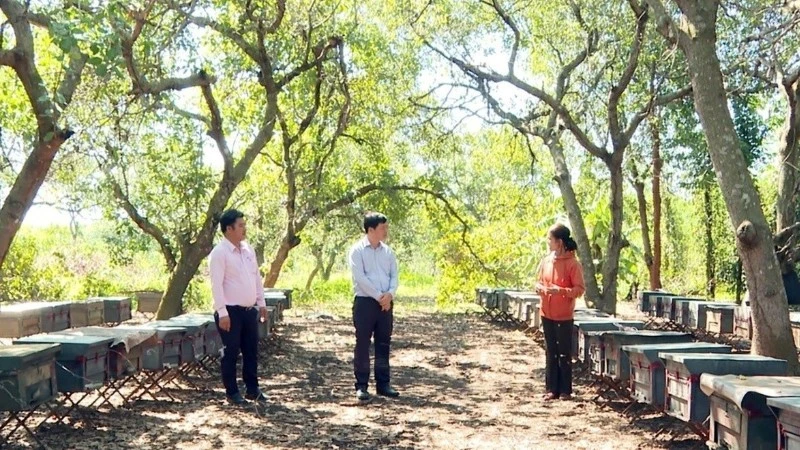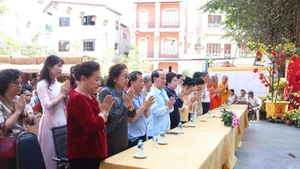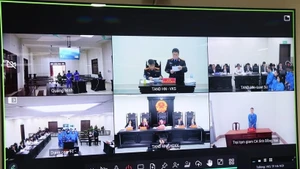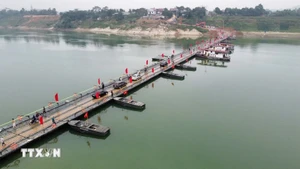Dong Nai Province is home to more than 400,000 ethnic minority residents, most of whom live in remote, mountainous, and border areas.
To improve living standards, Dong Nai has prioritised multiple funding sources, integrating them with national programmes for socio-economic development in areas with large ethnic minority populations. During 2021–2025, the province has implemented a range of strong and synchronised measures, achieving remarkable results that have transformed rural landscapes and improved people’s livelihoods.
From 2021–2025, central and provincial budgets have allocated 1.157 trillion VND for socio-economic development and improving living standards. By the end of July 2025, 762.5 billion VND had been disbursed, reaching 67% of the plan. Notably, investment capital disbursement for infrastructure reached 73.9%, demonstrating strong focus on essential facilities and public works directly serving local people. This is a major effort by the political system, as disbursement progress is always considered an important measure of policy effectiveness.
In addition to central funding, the province has mobilised maximum socialised capital. The provincial “For the Poor” Fund contributed over 22 billion VND to build new houses for poor ethnic minority households between 2023–2025. Policy credit sources have also promptly disbursed over 18 billion VND, helping thousands of ethnic minority households invest in production, animal husbandry, and occupational transition.
Thi Lien, a resident of Ve Vang Hamlet, Loc Quang Commune, Dong Nai Province, is among those who have sustainably escaped poverty after receiving housing, water well, and breeding cow support from policy funds.
She shared that her family used to live in poverty because they had no farmland and no stable jobs. After receiving State assistance based on the family’s registered needs, combined with the couple’s own hard work, their lives have improved significantly. “Our children can now attend school properly, and we are very grateful,” she said.

Also benefiting from policy credit, Dao Thi Vin, a resident of Soc Rung Hamlet, Loc Quang Commune, expanded her pepper plantation, securing a stable family income.
Dao Thi Vin said: “In 2021, I boldly borrowed 50 million VND for three years. Thanks to this funding, our pepper garden developed well. It has now yielded its first harvest, and the vines are thriving, bringing financial stability. In 2024, we were again approved for a loan of 100 million VND to expand by 500 more pepper pillars.”

Between 2021–2024, the province reduced poverty among ethnic minority households by over 4,100 families, far exceeding the national target of 1,662 households. Average per capita income among ethnic minorities rose from 28–30 million VND/year (2020) to over 42 million VND/year (2024).
Remarkable changes in ethnic minority and mountainous areas include: 100% of communes now have asphalt or concrete roads leading to their centres; 100% of villages have hardened roads; 81% of schools are now solidly built, and 86% of health stations have achieved national standards, with full coverage expected by the end of 2025; 99.7% of households are connected to the national power grid. As a result, both the material and spiritual lives of ethnic minorities in Dong Nai have improved steadily. Many families have escaped poverty, become well-off, and emerged as local role models.
Furthermore, Dong Nai has prioritised significant investment in education — considered the “golden key” to unlocking a brighter future for ethnic minority youth. As a result, 99.5% of five-year-old children attend preschool, over 99% of school-aged children attend primary school, and 98% attend lower secondary school. Ethnic boarding schools have proven effective, serving as “cradles” for nurturing educated and skilled ethnic minority youth.
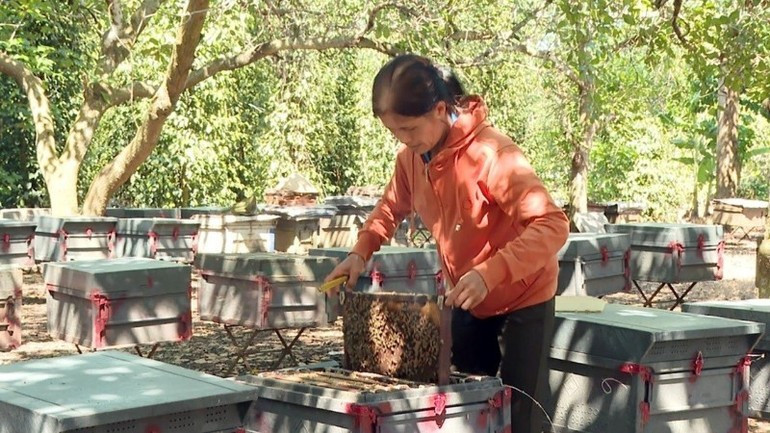
For the 2026–2030 period, Dong Nai Province plans to mobilise more than 6.6 trillion VND (including 4.53 trillion VND in public investment and over 2.07 trillion VND in recurrent expenditure), focusing on addressing fundamental issues such as housing, clean water, essential infrastructure, along with developing education, healthcare, culture, and community tourism. Special attention will be given to ethnic minority groups with very small populations and those living in border areas.
According to the Resolution of the First Provincial Party Congress of Dong Nai for the 2025–2030 term, the province will continue to prioritise education development, improve human resource quality, and strive for 80% of schools meeting national standards. In particular, the education sector will focus on building and upgrading schools in eight border communes, ensuring that students and teachers in these areas are not disadvantaged compared with those in urban regions.
Huynh Thi Hang, Deputy Secretary of the Provincial Party Committee and Chairwoman of the Viet Nam Fatherland Front Committee of Dong Nai Province, stated that constructing and upgrading schools in border communes is a key political task and an important component of socio-economic development. It is the shared responsibility of the entire political system and society to enhance intellectual standards, improve human resources, and raise living conditions for people in border areas, thereby contributing to stronger national defence and security.
The Dong Nai Provincial Party Committee has also directed departments and sectors to study and propose special policies, design standardised school models that meet technical and spatial criteria, and ensure the efficient operation of educational facilities while avoiding wastefulness.
